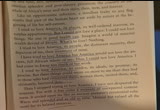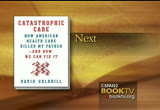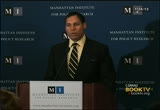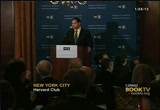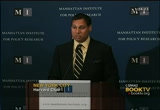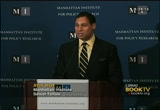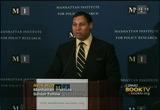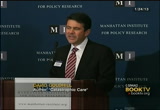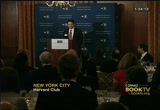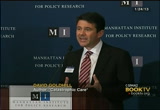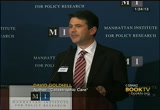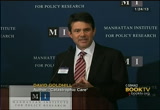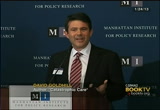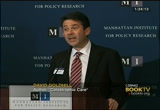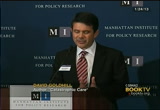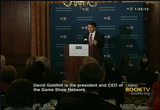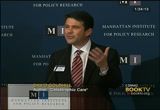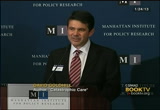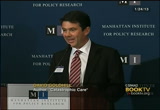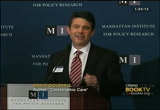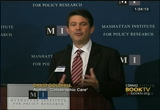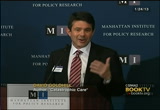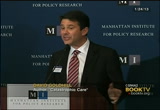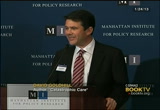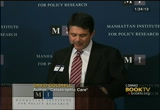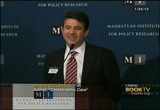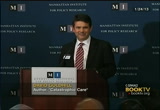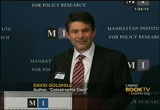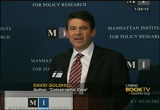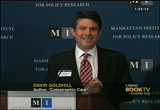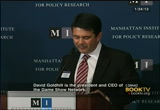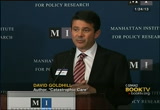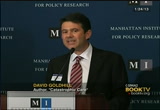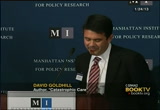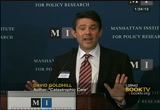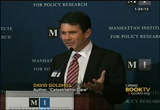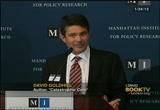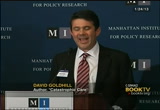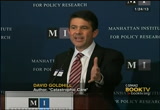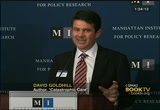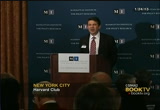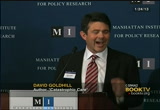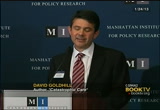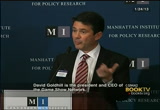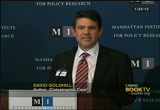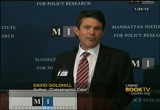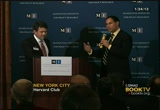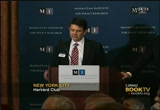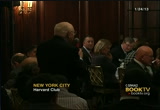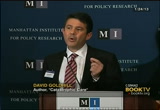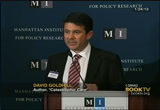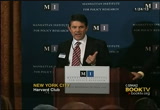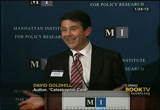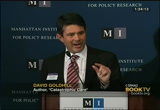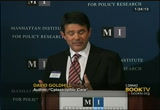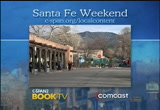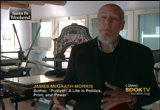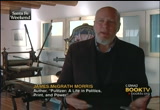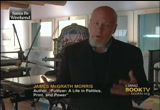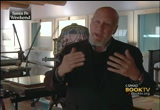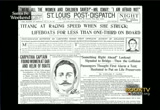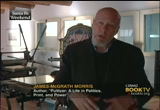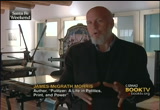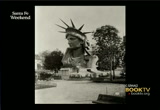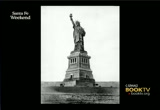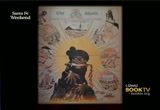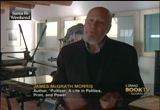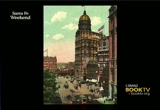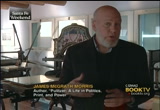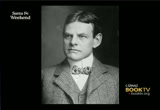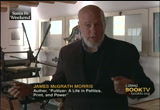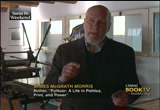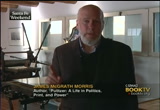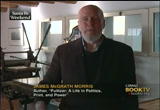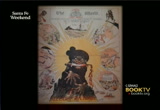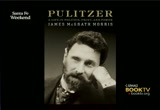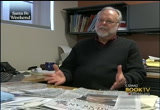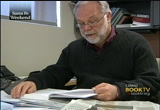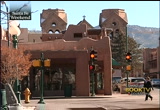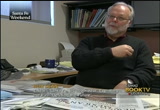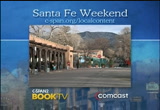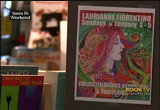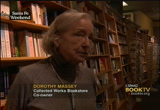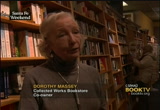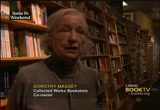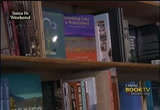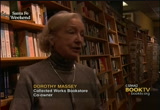tv Book TV CSPAN February 3, 2013 3:00pm-4:30pm EST
3:00 pm
credos, its ideals, its promise, its process, then i stopped trying to love america. i have not despaired the moment, for with it has come a measure of unexpected contentment. it settled upon me like an ancient ancestor's ceremonial robe, warm and splendid and as old as time, mislaid but valued all the more for its belated retrieval. randall robinson, thank you for being on "in depth." >> guest: thank you for having me. ..
3:01 pm
we are going to get started if you don't mind. thanks to all of you for coming here today. i'm a senior fellow at the manhattan institute's center for mathematical progress and we are delighted to have david joining us this afternoon to talk about his new book catastrophic care how american healthcare killed my father and how to fix it. i think that there is -- when i think about health care i think of to challenges i think the conservatives have had on health care. the first is it tends to be
3:02 pm
little to criticize and critique the health care system because of the march and injured population and the response is than to say while the health care system is just fine. it's the best health care system the world. don't mess with it. don't change it. i think the second blind spot of conservatives in general the certainly in health care is the we tend to talk about policy, public policy philosophically or with charts and data and they are important, but a lot of times the way the liberals have one arguments is by talking about the single mother in oregon who doesn't have health insurance and what we need to do to help her or the child is born with cystic fibrosis and the child cannot get health insurance. these are real challenges in the system. there are other challenges for people injured that health coverage that are set up in the way that we think they should be
3:03 pm
that struggle with a convoluted mess, the expense and the mistakes in the health care system. what is a reflection of those things isn't that surprising but it took a lifelong democrat, david goldhill to write a cover story in the atlantic about how the american health care. american healthcare didn't kill its father because david's father was uninsured. david's father had insurance. he was on medicare. but because of the on responsiveness and all of the incentives in the system that lead the american health care system not to be concerned about the patient first and foremost david's father tragically dies and i sure he will talk more about that in his remarks. what is great about david goldhill's writing and his book is that he not only talks about
3:04 pm
the real people not just the uninsured but every american in the health care system and how they see it in a way that makes us understand how much better our system can be. but he critiques it from the free market point of view that there are so many things about the health care system that can be better precisely because it is in the market principle. one of the great cliches in the policy is that health care is different. healthcare is immune from allow all of the economics that affect every other aspect of how we live. and what david has done in his book is a great service in that regard and explaining how in fact healthcare is much like other sectors of the economy. david grew up in new york outside of new york city and his father was a psychiatrist. he went to harvard college and then got a master's and became an investment banker doing mortgage finance at morgan
3:05 pm
stanley lehman brothers where he had a front-row seat to fannie and freddie which is something we might hear more from him in the q&a. then he got in television and he's the ceo of the game show network and came very late in life because of his tragedy. he wrote a cover story in atlanta magazine called how health care killed his father, killed my father, and then turned that into a book. it's an incredibly compelling book that i would encourage all of you to buy. there's copies outside. i am constructive to say the next season of american bible challenge, the highest rated show is coming on a few weeks. the game show network can feel like we are not stealing its ceo and we are giving them a plug, too. please join me in welcoming david. [applause]
3:06 pm
>> thank you. i'm sure everyone here reads your blog but it is a thrill. thank you for that and for the introduction today. and everybody for coming. i am here because of what happened to my father and it is what got me interested in health care. as you can imagine it's a very difficult experience to go through. even worse for my sister who's an emergency room physician and watched sort of helplessly as my care was botched. about six weeks after my dad died there was an article in the new yorker about hospital in plater affections which i know nothing about and read about as many of you are probably
3:07 pm
familiar with. somewhere around 100,000 americans die every year from hospital infections. i'm sorry. let me start again. somewhere around 100,000 people die from hospital infections, and most of them are fairly easily preventable. not all of them, but most of them. the doctors that would design particles to prevent them failed to have hospitals adopt them even though they were relatively low cost. i used to run a movie theater chain among many other jobs like held for incredibly short periods of time. [laughter] you know, when someone spilled a soda on the floor, we had a rule as to how quickly you have to mop it up so that no one felt. then you read about an industry where 100,000 people die and they could fix it it wouldn't cost much but they don't. and i think the combination losing my father and the sort of business man's curiosity however e-business is run it made me
3:08 pm
wonder why do we give this industry pass about so much? i think all of you in this room, and it's one of the great things talking about health care has been patient sore loved one's patience and there's roughly 310 million people in this country who have a story about health care or wide we give the industry a pass? we would never accept this and anything. a lot of us say well its health care. fundamentally different. what i want to talk about today is two things. number one is power it is fundamentally different, but the way that we have come to think of it, and i think it is blinding us to the change in health care that has occurred since the first assumption that got our system and many other systems that became conventional wisdom. the second and more briefly is what we can do about its to begin to fix these problems.
3:09 pm
why health care in the country is so expensive, so wasteful that same time often unavailable to people who need it. so deliver such service we don't even think of it as customer service is the punch line to a number i won't tell, but the punch line is because they can carry it to me it is the most fundamental thing to understand about health care is that nobody else in any other service trying to get your business can get away with this. they can't. someone will take your business from them. that's not the case in health care. and health care we built the system that has the most perverse incentives. more care over good care. more expensive care over less expensive care and less investment in the kind of things that still your patient customers that do care about
3:10 pm
them which is safety and service and handling of information and all the other little things we see. and it's great in politics to find this you know drug companies are in terse, the unions, but the problem is the spending time in health care what you find is people who are often so motivated there are people who are devoting their whole lives to carry and others and the evil the institutions you will find lots of people who got into it and they're still in it because they think they're helping others. so you have an interesting mix, a system that i regard as catastrophic and a number of ways, and people who seem to be motivated by greed reasons for being there. to me the bridge between understanding goes to is just the incentives in the system. the economic incentives for the bad outcomes are so powerful that it overwhelms the efforts of good intention the people.
3:11 pm
not exactly a catchy phrase, right? the incentive isn't going to get anybody elected to power but i think it is the key to understanding how the system works. and health care we have decided we don't want to be the customer. some private insurers, medicare through the cms and state agencies they are the customer. interestingly if they step back from the intricate be made about health care and ask yourself how well does the incentive to work in health care? it works perfectly. the health care providers meet the demands which are very different from ours and i want to talk about how. let me talk about some of the biggest assumptions we have in health care. the biggest is reflected in our language. nobody, or almost nobody, forgive me, almost nobody talks about health care prices. we talk about health care costs. it's interesting in the
3:12 pm
political d data about health care you always hear the word cost as if there is an independent thing going on, an amount of kryptonite that provides all the health care we've only got so much of it that it's priced on another plan that. every cost as we all know is somebodies labor, somebody's capital, and the health care i think is incredibly blinding. we think that there is a cost of things and if we can discover and pay as little close to but we have done well and able to alter policy is about discovering the cost as if you can. in the book a joke about the cost. the cost of tom cruise is $20 million. he has about as many molecules as any of us do. he actually does pretty much as much training as an actor as any of us do. [laughter] but none of us have a problem making a movie paying the cost of tom cruise because of a self
3:13 pm
but that's his cost and it's also his price. tom cruise goes to work as a janitor he doesn't get to say my cost is $20 million because his value isn't. and in health care if you listen to how we try to regulate health care it is about discovering that thing, that cost as if it is independent of the supply-demand technology and all the factors that set tom cruise cost at $20 million. there are a lot of illusions and health care and probably the most important in health care i think is illustrated what i would call the tale of two women. one is elizabeth warren. elizabeth warren argeo, and i think in some ways correctly that one of the issues of the financial crisis is a lot of people apply for subprimal loans without understanding what it costs them, the documentation and the disclosure and this was
3:14 pm
one of the things that congress would try to correct. the very same principle hiding from us the cost of fractions is the foundation of our health care system. let me talk about a second woman. her name is becky and she's a 23-year-old the started to work for my company. as a, i will talk about what health care is going to cost. she thinks someone else is magically paying for health care. on of the fascinating things is she was really successful, she probably will be. she's an extraordinarily capable sales assistant promoted to sales woman and she probably will be better successful. becky thinks that she's going to get to the top 1 percent of income and she thinks that she can never afford health care on her own. it's a problem if the system is such that even someone in the
3:15 pm
top 1% -- who is paying for the ever 99%, but that is what she believes. in fact if the cost of health care increases buy exactly zero from now until then he dies, she will put $1.2 million in to run health care system. if the cost of health care increases only at the rate of the affordable care act estimates for the next ten years in other words if it is successful, she will put 1.9 million. if she has a spouse that is working but becky is the breadwinner and provides insurance, under half million dollars. the two of them will put $2.5 million in the health care system. i will mention a couple things. she's entry level. these assumptions is assumed to important things colin cauchy never gets rich. it's not becky's idea what's going to happen but it's likely. her income will grow two to 3% the rest of her career and she never get sick. the key element of the health care system is this showdown.
3:16 pm
but he thinks i'm paying for her insurance. i'm not. she is. another thing every economist left and right agrees on is overtime -- notte tomorrow. if becky walked into marlene and said you can have your health insurance back, give me my money, that wouldn't happen. but it comes out of what we would compensate on employees. i know it is true for my company and for company i know. it's true. you would rather have them paid and not paid over time is coming out of what they were willing to pay you. that's a big part of it. parfait we all know about the tax that's gone up significantly to the taipei and, she pays it, i pay on her behalf, she pays it. right now 20 million coming up to 25% of the burden goes up to subsidizing health care. 10% going to 15% of the tax burden goes to finance medicaid. the point is that when you add all this money and it is a flood of money. why does it matter? the reason it matters is our
3:17 pm
health care system is so inefficient that the average person not only could afford their health care bill would save an enormous amount of we transferred this back to the expanded customer. we are not going to do it, but enormously changes your perspective on what is happening. now a lot of you may be thinking that well, what about those that can't afford it? what about those that don't have a job? we spent around $850 million on subsidizing medicare and medicaid. it's what we spent last year and we will spend this year. you could give 100 million americans, $8,500 in year with that money. the family of four that is $30,000, give it to them every year of their life. so in fact you could take the current system, the current spending, including everybody and have a complete consumer driven system. we are not going to do it but we could. that's how much money we spend.
3:18 pm
i'm not sure he would want to be called this the the father of the system it's the 50th anniversary saying you have a problem with health care? it's different than everything else. the consumer doesn't know and the doctors know everything and they can push the goods on them to reduce the argument for having insurance or medicare or medicaid on our behalf. the problem is that article was written in 1963. a lot of the asymmetry in the information that he was writing about is no longer the case. in fact is beyond the fact we can sustention formation to read the health care has exchanged and has become far more individual and a lot less about an author mechanic, a problem of your engine, you fix it, you're done. very little the health care is like that to get most of it is you have three or four treatment alternatives and there's a variety depending on who you are and every patient is encouraged
3:19 pm
to do this but there's a bigger conceptual problem with what he wrote. you probably know about all by is being chased in their yet he switches from sneakers to read you can't outrun of their in sneakers. he says i don't need to outrun the bear. i need to help run you. [laughter] the implication to which the argument has been is that because we are such terrible customers of health care the insurers would be better. both have a 50 year history of this and they acted like us and the have been as effective as us. one of the great misperceptions is that it depends on the consumers but it doesn't. well mark wasn't created because they said we demand lower prices. someone woke up one day and said i know how i'm going to make my
3:20 pm
billions. no one does that in health care because we are not the consumer. i want to come back to this point because it is the most misunderstood thing about people who say we want consumer driven health care. we want consumer driven health care because consumers are idiots. he was right. we don't know anything about anything. by the way his article has been an almost every industry held dumb we are when it comes to buying things, how irrational and emotional. it doesn't matter. as a group, having people chase us, then over backwards to buy their product is what causes good behavior. not that we are clever and i want to come back to that. the issue is we are one of the worst consumers but everyone else is worse and that is what we think we should have discovered 03 and over again in a free health care conference. the other assumption implicit in the system is there is an objective amount of health care
3:21 pm
need and if you look at medicare and medicaid one of the ways they are unusual as they say everything you need we will pay for to recline in favor of a similar policy of cable television because curious what would happen if the congress said we will pay for all the television you need, we would convince you you need to watch 25 hours a day. what's happened in health care and we see it particularly in medicare when you tell industry will pay for all of your customer needs the expands the definition of the need and an interesting thing going back is when the customer has absolutely no scan it in the game at the moment of the purchase she is more likely to say yes, not less likely. the concern was we as consumers are too weak and the doctor tells us to do something we will do it but the system makes us more likely. the reason medicaid and medicare have grown so much is that, the entitlement, not the
3:22 pm
beneficiaries. that's the way people think of it. as the entitlement to the providers to figure out ways to. my mother is an extremely healthy woman who -- [inaudible] i know she's on medicare and she's incredibly healthy and she works, there's nothing wrong with her yet she sees 12 to 15 doctors a year. my mother is a breast cancer survivor. when you look at the senior citizenship that medicare has caused, one could make the argument that is rarely made that medicare is bad for seniors. i don't know how many are aware that there was a study published in atlanta's last year that said there's one out of three medicare patients that had surgery in the year of their death. it's completely shocking. the former health cost.
3:23 pm
there's a great recovery issues. one out of 590-year-olds and everybody in health care knew how to read this. this is a system gone amok. they're taking five or more prescription drugs. some of this may do good. i'm not here to argue whether it does good or bad. what i'm talking about is as long as the system says whatever review needed we will pay for the definition will expand and unfortunately it will expand without reference to the whole customer. it extends more in reference to the industry and if you look at how we got to 50% of the country having a chronic condition i think it is best to understand the policy in the health care reality. if you want everybody to nod in agreement and a conference of health care you will mention another piece of the conventional wisdom that on the
3:24 pm
face we should have realized was observed and that is 70% of health care expense in any given year are spent by the 10 percent of the population that most needs at. everyone knows what that means. that is unusually intensive. every percent of all care for 10% of the people and as far as i know, no one in health care ever asked what about other industries? because it is interesting is if you look at health care as an expensive goods and service, that 70% is probably the least intensive use under 10% by 100% of the cost in any given year. under 10% in any given year. under 10% are attending college in any given year and under 10% will buy a refrigerator. i can go on forever and maybe
3:25 pm
the rest of my time i should do that, but when i started talking about health care no one ever said laden benet what makes health care unusual is that in any given year 30% of the money, the near $800 billion is spent by the 90% of us. it's the exact opposite of the conventional wisdom means and the key phrase is in any given year. that is a financially tragic event but in health care of the houses are going to burn down. it's sad and true. i hope i'm not the one bringing this to people's attention, but when a large percentage of us in the room are going to be in that
3:26 pm
10% for a few years of our lives. what makes health care different is that some small percentage of the population is in that 10% for much of their lives but that is an argument for the fact that your house burns down is not an argument for insuring your furniture wearing out and the problem in health care is that everything we talk of as if there is one when, there is one answer there should be one way out so we take the most extreme examples which will affect very few of us and use it to cover the bulk of the economy as if we regulated restaurants according to the needs of those that are starving. one can argue we need to help those in the 10% for many years of their lives that's different from saying the system should fund the $800 billion spent every single year.
3:27 pm
again sought assumptions that are unquestionable. my dad's bill for the hospital killing him was 636 willson $687 my mother's share was $990 which she didn't pay. if you are in business you know it's important communicating with your customer. this bill communicates that you are lucky to be on medicare because none of the crisis in the bill there is almost anything of the cost it makes no sense whatsoever. but if i moved out of the hospital and put up the four seasons i will pay for the most expensive hospital in town. what million and the people there that may let me do that the physicians to spend two hours a day with them roughly more than they would spend in
3:28 pm
the hospital and gave our round-the-clock madison? the would be priced assuming i didn't make a deal in the hotel in the $150,000 to take them out of the hospital and recreate the experience in the most expensive hotel in town. that leaves $500,000 for the miscellaneous supplies which is good. now i am not complaining that we only had to pay $990, but i am pointing out that you have ever received a health care bill from your insurer or medicare anywhere it's all fiction. fiction is great. i love fiction. the problem is people will say things like if i didn't have health insurance -- a friend had an appendectomy and they charged him $10,000, which is insane if
3:29 pm
you have ever had one but that is what the bill said. how could i have never afforded this without insurance? of course his company paid $18,000 a year for his insurance, so if they had given that money to him his family but have run out well before they would have run out of money to the effects the way that we think about this now. mike and got a bill for something like $400,000. that sounds pretty good. except there is no $400,000. it's completely fiction. the problem is that affect the public policy decisions that even worse if you spent time in hospitals it affects the way they think about the business to make it affects the way of resources are allocated. my son needed an appendectomy a month ago and we got as all of you have gotten the first comment from the injured which
3:30 pm
is our medical examiner determined that we couldn't approve the hospital stay for the acute appendicitis. we don't have enough facts to show that it was medically necessary. this is the real cost of insurance. in the consumer driven system you don't do any work. in a non-consumer driven system you are driven to get your money back and that is a part of how it works. that's part of for turning over and being the customer means. one of the answers the political system has forgiven is not reform the payment and get rid of the fee-for-service or change the rate that we pay people. what is great in the way that congressional budget office scoring marks but the interesting thing is reforming the pavement like so much and health care is the discussion for having the medicare problem
3:31 pm
is based on this enormous fallacy that industry will not respond but everything will stay the same. of the ronald reagan administration implemented the most important payment reform in the history of american health care which was to bumble payments for almost all inpatient costs pulled goods under what is called the prospective payment system so you have a diagnosis they would pay per diagnosis and the time of 1983 the bulk of the revenue in the health care system came from two things, physician services to pay for doctors. cahal successful this was. it's extraordinary. the number of days per medicare beneficiary has declined by 63 percent. the days spent in hospitals total our medicare patients so
3:32 pm
even though the population has doubled the decline by over 50% to read each procedure in the hospital has declined by 50%. so politicians talk about the payment reform to drive change can you imagine a greater change and basically covering bocor practice of the health care industry at the time in half? as we know the cost of health care declined by 50 percent. i'm sorry. [laughter] i'm sorry. i get excited about successful reform and i miss a couple of lines. if you cut demand for somebody's product per day by 50%, total by 60% you must crush prices. the average amount medicare reimburses in the hospital has grown since 1983 to be a 60%
3:33 pm
decline in the number of patients, increase in the price. we should all be so lucky. there's another statistic that this entire yearly irrelevant but fascinating. they can compare the price they pay to the hospital cost. in those 30 years that medicare increased the price of the hospital by 510 years the hospitals reported eight times comes the interesting thing is our demand collapsed in any industry that would have been devastating. medicare paid five times as more about the hospitals say they are now only getting reimbursed 40% of the cost down from 70% and one of my most fun you have to stay outside to see this is that
3:34 pm
medicare insists hospitals perform medicare services at a loss and you can see the number it's been growing over the last decade. since the medicare patients are the bulk of the hospital patients nobody is ever expansive or ask why people were still in the hospital's because you would think if you lose money on every patient you want to reduce volume, not increase. there's a lot of that and health care. they would be building the factories. i want to spend one more moment on the prices because one of the things most misunderstood is still little wonky but this his the way human beings receive service. one of the things that we assume
3:35 pm
is we pay for health care. how do we pay for health care and one of the arguments i am making today is how we pay drive is the type of care that we are getting. the government policy on health care it pays more for every service than the private insurers do and if he's even less. it's called cost shifting to the excuse me. it's almost impossible to compare the prices on the specifics service, so the data that i have actually says it is good to have a single service and its from michigan. at the time in michigan the private insurance is paying just under $800 for an appendectomy to the surgery. medicare was paying $676 million. medicaid is paying $335. sounds like a great deal for medicaid. many of you have been in the cheeseburger markets. you can buy a cheeseburger at
3:36 pm
mcdonald's for 99 cents and go to the cheesecake factory and have a more leisurely meal and by a cheeseburger for $11.95. you can go literally to the neighbor and by a cheeseburger for $32. if you were in health care what you would say is there's cost shifting between mcdonald's. here is my fear. my fear is we are seeing three different health care systems of the country. the reason medicare providers can say the service is at the losses because they do make it out and the package. it's one of the reasons they're getting more care. what is being sold to the patients it is hard to believe they are not more in the mcdonald's business.
3:37 pm
mcdonald's makes more money because they will sell you five and they don't give you much service. medicate i'm afraid of something else is happening. you look at medicaid and it is interesting. the rate of growth in medicaid services has gone up rapidly but not all of them. the things that you can do high-volume testing and certain types of surgical procedures have gone through the roof hawken. but we think of as normal care that takes a lot of time and expertise will think what you see medicaid is an industry response to the members but if i have a business model unless we do volume i will take a medicaid patient and if i don't, i won't. again, this sounds very wonky but think of what it means for the patient. we think of health care can we get your health care? the affordable care act we put 15 million more people into medicaid. if in fact what we are doing is driving different types of service than we have an issue.
3:38 pm
we were talking about how few are left some medicare will cost $600 billion the seniors are the best customers of the health care system. how is this possible? because the way you reimburse says you can get this type of care but not this type of care and when we talk about health care to it, we talk about health care. we don't say there's too many spinal fusion or hip replacement or too many people on the hills. there are too many cat scans. we talk about health care as if it is one thing, as if it is a cheeseburger but even cheeseburgers are different and my feeling is what we are missing in the system is this: we are driving the decisions based on the economic incentives, and it is not as simple as isn't as great we are making the private insurers bear the cost and the government is less. i want to spend just one more
3:39 pm
second on the consumer service. 50 years ago, there were 20,000 computers in the world and ten years before that the estimate is there were 250. probably 100,000 people who knew how to use them. computers were extraordinarily complex. today almost all of us are carrying at least one on us and several have to come three, four, five. all of us everywhere on earth. what happened as we all know is that everybody became really smart about computer science. we all have a ph.d. so the product that 50 years ago only 100,000 people can now successfully be used by 7 billion of us. of course that isn't true. when you hear that health care is extremely complex for the
3:40 pm
system's one of the things to remember is that nobody in health care can make money by making it easy for you. nobody. and think about the computer. i don't understand anything about how any of my computer's work at all. i have three phones, lap tops, tablets, it's not because i know anything about how it works and it's also not because there is one that is the clear superior computer that we all must act. it's not because of the opposite. it's the most impossibly complex thing in the world. at the dawn of medicare it was used by the irs and ibm. it's used by all of us because nobody said it is too complicated for consumers. somebody said i don't know how to make a living. i'm going to figure out how to make it smaller and smaller more than the other stops. we released a study this month
3:41 pm
that said the $81 billion in savings we were going to make by having an investment produced no savings. it's too bad because the government put $25,000,000.40 billion investment why would they not produce any savings? if you've been to the hospital or doctor that you can see in front of you i filled out the form for him, nobody would have done if he wasn't an adult, the surgeon matej said almost certainly iraq to the pimex let's get a scam on him to confirm that. we felt the same seven page form
3:42 pm
we felt the same 15 minutes before but i know you've all been through it. we went to the emergency room where just for fun while they were waiting for a room i said if i were to pay for this with cash what would happen? it was the equivalent of saying i have a bomb strapped to my chest and i am going to blow up the hospital unless you perform this appendectomy to get the panic of this belief of what is cash. [laughter] and then of course because he was in pain. the surgery was delayed because the had no computerized way of looking for tracking the rooms. they gave him morphine or tried to.
3:43 pm
the pharmacy was i would guess 20 yards away from where he was being held for an operation and it took an hour and a half to fill that order for the but the big picture in health care. forget about the insolvency. we are going into the system that we need constantly that's been fully integrated in our lives that we are using to manage or to improve our lives
3:44 pm
in extreme cases all good things. being treated as we shouldn't be there. we are lucky to be there and seeing them rise from the eye rolling. having won a physician not talk to another, having hospital staff changeover faster. they discovered that one out for medicare admissions now leads to a health care problem created by the hospital. that type of risk is nonexistent but you can't get that risk in
3:45 pm
combat. one of the reasons we give it a pass. how we see it performs and it compares to the cleanup, we don't do that. we need to put it under the microscope we need to recognize health care in the future is going to be part of our lives. we need to rethink the basic principles. [applause] of. it's not merely to be polite to gargasz it is one of the best health care policies we've ever
3:46 pm
read. let's have some questions from the audience. stanley i think back there there was a physician and the rumor. do you know the average survival was about 50 years ago. >> now we are in the high 80s come into the 90's that is because of the health care that we have. you know, it is a blanket text but let's take the computerization. he forgot to tell us "the new york times" there was an article that the study that was done by your non-that said computers
3:47 pm
would solve all the problems with a decrease the cause and if you ask anyone in medicine it's going to increase the cost if you press a button you will have the high your level of care. to reach the hospital that by matt had one of authority million dollars to implement, and even my technical friends because we had to set up the computer taking care of the patient. the of the point i'm going to make is the other day there was a story in the new durkheim's that had nothing to do with hospitals and doctors that have fined $750 million they've gone to jail coming in with inducements with this we are going to make more money, putting more money into people can make more and of the doctors
3:48 pm
that did this should have gone to jail because right after this that lets them use the drug again. let's take it easy. if you want to talk about the sanitizers, i'm sorry. let's address that. there's a couple all-important points, one of which i agree with and one of which i don't. the first study which showed the 80 billion for a different reason. and should have been obvious to us. first study said 80 billion in savings of $40 million of investment. that is a 200% return. i don't know what anyone on the rim is getting on their money. but i am getting less than 200% and i want a piece of that. what they didn't ask is why you the industry hadn't made the investment itself. why did the industry that could achieve $80 billion in savings
3:49 pm
not making 40 billion-dollar investment. not asking that question they missed what was going to happen. what was going to happen is that in health care and i'm talking about industrial structure, not about people, nobody can monetize the $80 billion in savings. when you're dry cleaner invested in i.t. it's not because of dry cleaning is more technologically advanced and it's not because the people are better trained it's because it costs money. that's why all of us do it. and they missed that. $80 billion translates into no increased profits. the most technologically advanced hospital chain in the country is widely regarded. they had said all technology investments have cost sumartran 25 to $50 million a year. in the rest of the economy i.t. helps you save money you can pass the savings on to a
3:50 pm
consumer and make a fortune. that's what wal-mart did. it's all about the supply chain. so i think whether the study was right or wrong is irrelevant. it's obvious on its face it is not going to work because and 80 billion-dollar return on the $40 billion doesn't need the government intervention to happen. let's talk about the broad point that i think is important. you are right the life span has gone up and are continuing to go up. but i think as most people in the audience know while some amount of that is attributable to the personal health care, a much greater amount is attributable to public health and it is a far greater amount attributable to the lifestyle. what is interesting about the last 50 years is while the one area that we can definitely are to personal health care has increased the life span of cardiac care the bulk of improvement almost every single study has shown has been out the
3:51 pm
stocking and people creating fewer disabilities and to some extent there's a lot of uncertainty about that. there is no question if you do the comparative national work and look at a different life stands the personal health care is almost never measured in the numbers. what we measure is the it's a study in the u.s. that says the number one predictor of your life span now is your education. what is interesting about what we have done in health care spending 18% of our gdp on health care we have nothing left for any of their priority all of which are likely to drive the improvements. i'm not putting down the box. i am appreciative of the health care that i get, but systemically this is bankrupting us and exposing us to a variety of problems that are really
3:52 pm
extreme to the estimate as a reminder we are on c-span's if you can give your name and affiliation and keep it brief so we can get to as many questions as possible. >> what is your solution? in your wonderful speech it sounds like it is an argument for more consumer driven health care. i hear that you are a single-payer. >> i'm a combination of extreme left and extreme right. i think we need national health insurance but i think it has to be defined as catastrophic and i think interestingly what has to happen over time, we need to make it narrow rather than broad and do the opposite of what the government do which is expand the mandate. we cannot switch to that system today i don't believe without
3:53 pm
giving everybody the security that the house burning down a lot to be covered. at the same time, we need to drive as much of the 2.7 trillion that we are spending now back to people and whether that is getting insurance premiums down to the type of catastrophic level we are talking to some people can save more of the money, incredibly is inefficient or whether that means turning subsidies away from we will pay for your health care with all of the terrible incentives and care that is created to give you the money to pay for your health care which is different. but on a proposed working towards a system where all of us are in a single pool catastrophic plan that is narrow and house been narrowed over the period with the bulk of our health care running through the account of the whole savings account so that most of the customers from the point of view of the health industry so that what happened to my father and
3:54 pm
son is less likely to happen because that is what i'm trying to get to read it resembles more of what they've done in singapore than they have done in the single-payer state. and the health care has changed. more and more health care is truly non-catastrophic and the attempt to cover it with insurance is taking the most expensive most distorted complex administratively difficult form of the finance and contributing at. thank you all of you for coming. [applause]
3:55 pm
in 1607 by a small group of european settlers, santa fe changed hands several times. in 69 the area was conquered by spain and then in 1680 the indigenous indians won the land back. the spanish reclaim the area from 1692 to 1821 when mexico gained independence from spain and established santa fe as the capitol of the province of new mexico. mexico was ceded to the united states and 1848 as part of the treaty of guadalupe-hidalgo and mexico became a state in 1912. throughout this time, santa fe remained the capitol city. booktv brings you more from the area with the help of comcast next. >> we are here today in the
3:56 pm
press and behind me stand some printing press and this seems like a perfect place to talk about the man that revolutionized american newspapers. when i first started working on the book people reacted with recognition, but it's clear from their of expression they knew the name and not anything about its life because the pulitzer shows him being well known for the prize that he endowed but not for what he did in his life. very few people remember that he's an explosive munitions maker and very few people understand the significant role that he played in american history. like some of the giants of the 18th-century carnegie, morgan, rockefeller, all these people was a critical moment in history which is the industrial age. that's the age that made america the way that we think of ourselves today to review the roles that he played is the midwife with the birth of the modern mass media. before the time we didn't have the kind of media that we on
3:57 pm
every day the notion of americans that are checking the news are going to cnn, these are all the laws that were cultivated in that period. so it turns out of the pulitzer not only played a gig historical significant letter which made for the reading of the influence that he yielded is with us today >> in some ways it is an accomplishment as to happenstance. we are used to what it is. 19th century, printing was the internet. we all say i can build a ticket now and every day we exclaim and so the idea of getting news today quickly and easily are commonplace and we don't think it is such a big deal in a dalia reading about and i am not so sure that all americans really remember who she was or who rockefeller was or carnegie yet we drive across the bridges made
3:58 pm
with steel using cars powered by the world that rockefeller built and we are using the financial system consuming the news built on the system that was developed and created in the 1840's he can to the united states as a soldier to fight in the civil war and the north needed soldiers and they went to europe and recruited single young men promising passage here. she didn't really see any action. like many veterans after the war key was unemployed and it's hard to reintegrate people into the economy. he ends up in st. louis where he becomes befriended by a major german-american who becomes the senator from missouri and is a newspaper publisher he enters the world in the press at that point and he is doing everything in extraordinary rates in the modern-day immigrants within five years of his entering the united states.
3:59 pm
he becomes successful and i really shortening the story. inventing a very new form of journalism and let me give you a comparison. he is much like a modern-day server. they're sending one of them paddles with extraordinary speed because of a precede that bill on what is going to be the best we've of the day and the others don't. they don't see it. it was seen in the 19th century were the tidal waves of social change that he was going to ride. ..
4:00 pm
>> that he could sell to commuters that was entertaining to read, that contained economic information, advertising, so the wives would know where to guy gingham or flour, it contained the latest news so that the next day's papers were actually printing yesterday's news. and he did more than that. he discovered that in urban life there was this tremendous drama that you could write up in a nonfiction way the way dickens was writing tales of the poor in london. so the paper was rivetingly interesting to read, and all these elements combined into what people called western journalism s. sol like a broadway -- so like a broadway play, they test them out before they bring them to new york, well, pulitzer did the same
4:01 pm
thing. he brought the bankrupt new york world and within months was making millions of dollars and revolutionized journalism in new york. new york being the media center of the country at that time, he revolutionized journalism. one set of anecdotes, as i said,ing pulitzer created this newspaper in the new york world in new york, and he looked down to the lower east side where the masses of immigrants were coming in the 1880s and 1890s, and when i say massings, millions of peep -- masses, millions of people were coming into new york. and the upper class, the upper reaches of fifth avenue saw these folks as a dangerous group. they saw them as poor, dirty, you know, all these kinds of things that they visioned. pulitzer didn't see them that way. he saw them as potential readers, so he admonished his reporters to go and write about their lives. so the day's paper would say tiny to tot falls to his death m a tenement building. and the upper class drinking
4:02 pm
their tea with their little fingers would say, oh, such sevennizationallistic prattle -- sensationalistic prattle. this was their lives being portrayed in print. kids did fall to their deaths. in fact, in the summer it was so hot in those buildings, this is the most densely populated place in the world. people would go up to the roofs to breathe at night, and children would fall to their dret, and it was -- to their death, and this was chronicled by jacob reese. he was, in a sense, dignifying their lives. i give this comparison all the time, i say if you were to take me home, i bet on your refrigerator is a clipping of some sort you've excellent, maybe an accomplishment at school, those events occurred regardless whether they're in print or not, so why do we keep these? because writing in print brings dignity and meaning to actions. so the lower east side class of
4:03 pm
people saw the paper as their friend that produced this kind of dignity. the paper also was an entry into life. on sundays you'd get a paper as thick as a telephone book with dress patterns, easy-to-understand stories, serialization of literature. you know, we download music now, that's old stuff. then he printed this sheet music of the latest tune inside the paper so you could play the latest music in your house. so pulitzer built this enormously important, similar yachtic relationship with the poorest people of new york in his paper. and in return two things happened that were really amazing, one of which was the statue of liberty was being given to the united states by the french people. and in return we were supposed to raise the money on our own -- not the congress. and so the statue was basically on its way over, and we hadn't raised the money for the pedestal. so pulitzer ran a front page story about the scandal that no one has paid for this and an editorial saying bring me your
4:04 pm
pennies and nickels. i'll put your name in the paper and thank you for it, and we will raise the money privately. now, you have to understand he's a barren of the 19th century -- baron of the 19th century, so trusted the kids would come in with their pennies, workers would come in with their nickels and say here it is, i trust that you will use this. it's like my going to some major corporate leader saying here's five bucks, i hope you'll use it in the right way. the next day in the paper your name would be listed for that contribution. the same paper that had the vanderbilts, the astors and the morgans, there would o peer michael o san si's name for having given a penny. for the sculpture's pedestal was built, and in time the statue of liberty was put up, and this is a statue of pulitzer in the park where the statue is, on the island. so my architectural tour of new york to show you this, it's
4:05 pm
vital, important. the papers are being published every hour of the day. if there's an important trial in new york like the harry k. honor to trial in 1905, a reporter would state sit in the room, write the story, hand it to a copy boy who would pick up the phone, dictate it back to the paper. they would print that hour's trial, and little boys would sell, you know, so and so accuses so and so. that was the cnn of that time. it was so important that on election night people would gather by the thousands down on park row because there was no radio. and you'd look at the front of the newspapers where they had big boards, and they'd put the results in chalk. so pulitzer became, as i say, the midwife of this whole world of journalism in which people depended on it. they would say at dinner at night, did you read that story in the new york world or maybe the competitor, but the point is people would talk about it. so he went down to park row, and he bought french's hotel, and
4:06 pm
this is a great reason for young people. treason. 's hotel had kicked him out of the lobby as an indigent, unemployed veteran of the civil war in 186 5. so he came back, bought the hotel, tore it down. he built what was then the tallest building, and he built a dome-shaped top. so the top floors of this building which overlooked all of new york -- the tallest building on the globe at this point -- was where the newsroom was and where pulitzer's offices were. and what's so significant is it remade the landscape of new york at this point. think of it in terms of the empire state building in the 20th century, you know, that kind of profound effect. so just like he remade the landscape of journalism, he remade the landscape of new york with his building, and this is the profound moment that i think really illustrates it all. when those immigrants kept coming into new york harbor, and this is something people forget,
4:07 pm
there was no delta flight or virgin air flight to go o home and see mama the next year. you were betting your last dollars that you might be able to get away from to presentation you left and reestablish your life in this land. so it's a terrific moment. you're going to have your first look at the new land, and if fog is there, you know, maybe the fog will clear, and you'll see the statue of liberty. and those immigrants would see that. you go right by the statue of liberty. and they wouldn't necessarily note that the pedestal had been built with the pennies and nickels of the ones who came before them. and then they would turn and have their first look at the new york city skyline, the city that would welcome them, where they'd get their first foothold of the economic life, and if if the sun was right, it would be gleaming off the gold dome. not a monument yo manufacturing or -- monument to manufacturing or agricultural, the only explicitly-protected form in the
4:08 pm
united states, and the new york world that will be there, the ticket to understanding how to get ahead, the ticket to learning english and the ticket to american politics. that's the effect pulitzer had back then. he was a very difficult man to live with as a biographer. he was sort of like the howard hughes of the is theth century -- of the 19th century. at the peak of his power when he was the publisher of the, the most powerful publisher on the globe. his paper had the power of cnn and cbs news all combined. people read the world in a way that when i was a child we used to watch the three networks. he reached this enormous pinnacle of power, and he began to go blamed. so like beethoven, who couldn't read his own music, pulitzer couldn't read his own paper. and he became beset with a number of psychological issues, one of which was sound disturbed him. so he built a famous tower of
4:09 pm
silence, a room in which he could go in and get refuge from sound. his new york city mansion had a special bedroom which had separate walls, inch-thick plate glass to keep the noise out. if you were invited to have lunch with him and you ate your celery in a fashion that was too noisy, you'd get a memo the next day saying next time you have lunch with mr. pulitzer, no crunch-crunch, please. this became an obsession for him. and he became beset with all these problems. so the second half of his life he got on his yacht, the world's largest yacht -- well, to be correct, morgan's was 3 feet bigger, but one of these massive yachts. the engines were put in a special part of the yacht, and he basically went back and forth across the world. and one of the most daring writers that worked for him, david phillip graham, wrote him a note in which he had the courage to say to mr. pulitzer that your problems are not the kind you can flee
4:10 pm
geographically, a geographical solution isn't what you need. he was an impossible man to live with. once his daughter had a minor operation, very common place for kids, but it involved some bleeding. so the household was in a tizzy. it would be, a teenage daughter upstairs. and pulitzer stands up at the dining room table, and a waiter had written this down and said, hey, folks, what about me? i'm suffering here. so his self-centeredness, his egomania, his social issues makes him an absolutely fascinating character, and we're able to understand him better today. but the thing i loved the best about the book was his wife kate understood it better than any of us did. she loved him in a way that no one else could love him, and as he went blamed, she took a locket that he had with a painting of his mother, and she had a paintedder paint a really large version so before he could lose all his eyesight, he could still see his mother. and later i portray at one point she does have an affair, and i
4:11 pm
think the readers think, you go girl, he was so impossible. what is pulitzer's legacy? his legacy has two parts to it. he left in his will money to create two things. one is the journalism school at columbia university which is just celebrating it centennial right now. this is very important. it isn't just columbia university. i will admit that missouri has a journalism school, kansas, i mean, there are many -- but what's important about it is that pulitzer came to realize that journalism, like any profession whether it's being a lawyer or a dentist, required professional training. so he took his money to create a school by which people could become professionally trained or become journalists because it is a responsible craft. and what i think is so important about his legacy is i think a lot of the solutions to the modern mass media's problems today will come out of those institutions where younger people are trying to become journalists, and they have to figure out a way just like pulitzer did, to make it work.
4:12 pm
so in a sense the next pulitzer may come out of the school he created. so that's one important legacy. the other is the pulitzer prize. pulitzer prize was money he left behind to reward journalists and newspapers and writers and artists and other people for great contributions. and there are two aspects of it that are significant. one, if you get it, it, of course, changes your life. i mean, the joke is now you know what the first three words of your obituary will be, because it says pulitzer prize winner so and so passed away. but that reflects the power of that gift, of that prize. now a century after pulitzer's death, we're still honoring people using pulitzer's name. the other thing it does is something it shares with the nobel peace prize. if you look carefully, nobel peace prize is often given to people who are in danger. could be a woman in burma standing up for democracy, it could be a group trying to bring about peace in a dangerous place like northern ireland. and the reason the prize is is
4:13 pm
is -- is given is in a sense because you're not going to go and assassinate somebody who just won the nobel peace prize. well, the most significant pulitzer prize is the one for public service. and it's often given to newspapers who have been daringly covering something the community didn't want them to cover. and when they cover something the community doesn't want them to cover, the journalists are ostracized, the local towns often pull out their advertisements which is the economic base, and the newspapers take a tremendous risk to write about something that could be a scandal, it could be something important, but the community, you know, doesn't want to hear about it. and when they get the pulitzer prize for public service, it's a recognition, national recognition of the importance of what they've done, and in a sense provides that same kind of umbrella protection that the nobel peace prize does to people who are daring. pulitzer was an extraordinarily significant person who still to this day affects our lives. and just like, you know, a child may recognize all of a sudden
4:14 pm
they have a mannerism from their father or mother or a habit, you know, you suddenly say, oh, i'm just like my mother, you know? and you recognize those roots. we as a culture need to understand that a lot of the habits we have today come from people who came before us. when you read pulitzer or, you begin to understand a lot of the traits we have about consumption of news, understanding of news, news as a form of entertainment. i mean, these are all radical notions from his time that we inherited and have taken on to build our society. um, the other thing that i think is perhaps really important about blitzer and we need to think about it in a seismic change that's going on with the american media, pulitzer hammered away over and over again that the newspaper business is not just a business. it's a public service aspect to it. a democracy cannot function without an informed public, or that somebody has to be at that school board meeting at 2:00 in the morning when they're voting on a contract as to who's going to build the next school. and as the press shrinks today,
4:15 pm
there are no people at those meetings keeping an eye on things. and the press, ultimately, lights the darkest recesses of our society. we know about the harpedships about poverty -- hardships about poverty because of the press. we know about corruption of the government, and it gets fixed because of the press. we know about what's on the public agenda -- and sometimes too much. like the fiscal cliff we hear about over and over again. but these are critically important role that is the press plays, and i think pulitzer's story is a reminder of that. that, yes, these are businesses run by "the new york times," the grahams, "the washington post," but they perform this enormously important action of informing us. and the question we have to deal with as a society is as these papers no longer can support themselves, what will come next to replace them? so that would be part of what i hope people would take away from the book. >> booktv recently explored the historical and literary culture of santa fe, new mexico, with the help of our local cable partner, comcast. keep watching all weekend long
4:16 pm
for more from the area. >> yeah, yeah. >> [inaudible] >> i'm rob dean. i'm the editor of the santa fe new mexican, the daily newspaper that serves santa fe, new mexico. it's an institution that's 164 years old, and we are in the offices of the santa fe new mexican. i'm also the editor of a book published in 2010 called "santa fe, its 400th year: exploring the past, defining the future." the book had a humble beginning. it was not at first designed as a book. it began as a series of newspaper stories to commemorate the 400th anniversary of the founding of santa fe. in 1959 the publisher and editor
4:17 pm
of the new mexican had the presence of mind to ask a pulitzer-winning novelist, oliver la farge, to write about santa fe's history as it emerged through the pages of the santa fe new mexican. and he published a well known book called "santa fe: the autobiography of a southwestern town." at that time, 110 years worth of news as reported in the santa fe new mexican. the book that we published in 2010 serves as a nice book end to that volume, again, with the same spirit. the 400 years of history of santa fe was the bedrock of this series of stories that became this book. um, what we identified through 400 years of history is the number of themes or trends or issues that have been constant
4:18 pm
currents through santa fe's history is not a seamless narrative from page 1 til the end. it is broken into 12 chapters, so the timeline is full of all of these small e events and big events to put the history of santa fe and its episodes in cop text. -- context. the intersection of cultures is one of the identifying features of santa fe. its long tradition of celebrating faith and establishing diverse faith communities is another theme. of course, this is a political town. this is a capital city and has been the seat of government since its founding 402 -- 403 years ago now. and so the exercise of political power and the development of public policy is another theme. the history of santa fe is
4:19 pm
distinctive. for one thing, santa fe became a u.s. territory in 1848, and it was a territory for a very long time. the country and washington were reluctant to make santa fe a state. that eventually happened in 1912. new mexico exists as a territory for so longing, it in -- so long, it in so many ways doesn't seem to fit the rest of the country. in fact, santa fe proudly for a long, long time has described itself as the city different. santa fe, and new mexico were explored by the spanish coming from the south to the north. not from anglos coming from the east to thest. to the west. that's one difference. this is a community that's closely tied to the catholic church. priests accompanied spanish
4:20 pm
settlers on their way north, and establishment of the church and establishment of the community of santa fe are inseparable. and, of course, this is, was a spanish-speaking territory populated mostly by people of hispanic heritage. and there were questions from the east about what a new mexico and santa fe fit the definition of america. the flip side of that is there was a constant curiosity about whether santa fe and new mexico felt like it belonged. and there is, there was, indeed, many episodes of resistance to federal rule in new mexico. what is going on today, this rich and diverse body of faith communities in santa fe, but we constructed that on top of this foundation of faith being part
4:21 pm
of santa fe's history from the very start. santa fe has been the subject of many books by many writers, a diverse range of writers, and this, this book has a terrific bibliography for anyone who wants to read more about santa fe. again, broken down -- >> and now, more from santa fe, new mexico, home to about 80,000 people and 250 art galleries. santa fe boasts a rich historical and literary culture. booktv takes a tour of collected works bookstore, one of santa fe's 17 independent bookstores. >> welcome to collected works bookstore and coffeehouse. we're in santa fe, new mexico.
4:22 pm
my name is dorr gnu massey -- dorothy massey, and my daughter and co-owner, marry wolfe, and i, have owned collected works for 18 of its now 35 years. santa fe has a population of 80,000 people, and it supports no less than 17 independent bookstores. how does collected works and the other 16 stay afloat? it's not easy. we all work very hard at what we do, and it is a very mutually-supportive community of bookstore owners. the city itself is cultural with an amazing amount of very well-read, very literary people. we boast more authors and poets both genuine and wannabes than most communities, and the combination of six major musical
4:23 pm
organizations, an incredible museum system here, wonderful arts, ballet, opera. it is a rich cultural city, and the people that live here and the people that visit here come out and support that culture in all of its ramifications. the literary arts is just one of many here. i think what sets collected works apart is the fact that we really have this space. we're very fortunate to be in this beautiful space. we have the space to become a community center. and the fact that we do more than sell books. we have a very active children's program. we're not only in the schools through the rotary club and other endeavors, but we are also running our own story hours here two mornings a week. we have the space to do that. we have the space in the coffeehouse to donate out to
4:24 pm
501cs all over the city for their special events. we don't charge for them. it gets people into the store, so it's not totally kindness on our part, but it does bring people into the store. and it gives the community a sense that this is their store, that they belong here and that we belong to them. very often the first thing that is said is, wow, it smells like a bookstore. [laughter] and i think people enjoy that. they enjoy the fact that we have people who really know and read the books. and book selling is very, very different from selling almost anything else. you can go into a store, and you can see a red sweater. and if you like it, you can try it on. and if it looks good, you can pay for it and walk out. but 90% of the time you haven't read the product that you're buying when you're many a bookstore. so there is a great sense of mutual trust, mutual excitement, and in order to be able to supply that to the people who visit the store -- both locals
4:25 pm
and visitors -- we have to have a very well-read colleagues here. and there are 16 of us working here at collected works between the coffeehouse and the bookstore. i would be less than honest if i didn't want tell you it's been a very, i think the euphemism is an interesting three years since -- or four years since the recession. moving here, enlarging the store and, obviously, competing head to head with internet sales. which, at least in the state of new mexico at least as we speak now, still do not charge sales tax. we cannot afford to give the discounts, and we are required to collect the tax. b so we're not playing on a level playing field. however, having said all of that, i truly believe that the public perception of giant corporations is changing, that
4:26 pm
people understand the importance of supporting a local endeavor which hires local people, pays local taxes, is involved with the local community, and i am very proud of the 15 colleagues that work here with me and mary. we have a remarkable scientific community b both here -- community both here and, of course, in los alamos. alas, they lost their independent bookstore about a month ago. so we do a great deal with science and theory and a great deal with philosophy. this is a deeply religious city. people are anxious to know about other religions, so so religion does well. this whole wall behind me is paperback fiction, and that rolls out of here on a steady basis both to locals and to visitors who want something light to read while they're traveling and nothing tooer the or my important -- too terribly important. the opera breakfast meets here
4:27 pm
all winter long before the simulcasts from the metropolitan opera which comes to santa fe along with millions of other viewers across the world. and there's a breakfast here and a lecture, so we do a lot with music, a lot with art and pretty much everything. the history of santa fe is rooted in three major cultures; the native american, the his hispanic and the anglo. now that's, obviously, oversimplifying things. but each one carries a heritage that the writers are anxious to share. we boast the best of the young native american writers working today up at the indian school. we do events for them here. we boast the best of the spanish colonial art market. we sell books up at the indian
4:28 pm
market in august which is the large native american art market in the world, and for many years we sold books at the spanish market. again, the largest hispanic market in the world. so these cultures are here, and there are only 80,000 of us. so we're all kind of falling all over each other. and the sharing and the support that is universal in santa fe makes it a wonderfully exciting place to be. from the very early days, santa fe was a mecca for artists who were free thinking. a lot of people left the more strictured societies of the east in order to practice their religion, their lifestyle, their intellectual thoughts, share with whatever friends or acquaintances they wanted to. and so it has always been a very yeasty place for people who are really thinking for themselves. and it is only natural that the
4:29 pm
gorgeousness of the scenery, the light which attracts the photographers and the visual artists and then the performing artists who manage to both dance and sing at 7,000 feet above sea level -- it's quite amazing -- but the availability of a small town makes it easy for people to become inti plaitly a -- intimately acquainted with those in the arts, to serve on boards fairly quickly, to attend events, to meet artists. and the cross culture of visual arts, performing arts and literary arts is just a natural. >> from all over the city to see it, and paul and
128 Views
IN COLLECTIONS
CSPAN2 Television Archive
Television Archive  Television Archive News Search Service
Television Archive News Search Service 
Uploaded by TV Archive on

 Live Music Archive
Live Music Archive Librivox Free Audio
Librivox Free Audio Metropolitan Museum
Metropolitan Museum Cleveland Museum of Art
Cleveland Museum of Art Internet Arcade
Internet Arcade Console Living Room
Console Living Room Books to Borrow
Books to Borrow Open Library
Open Library TV News
TV News Understanding 9/11
Understanding 9/11